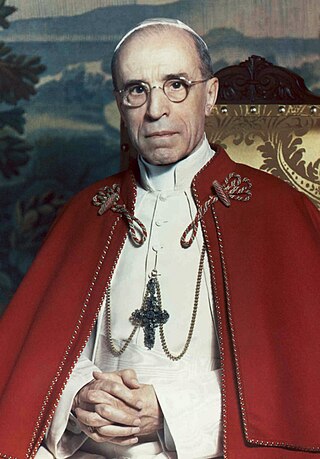
Pope Pius XII was head of the Catholic Church and sovereign of the Vatican City State from 2 March 1939 until his death in October 1958. Before his election to the papacy, he served as secretary of the Department of Extraordinary Ecclesiastical Affairs, papal nuncio to Germany, and Cardinal Secretary of State, in which capacity he worked to conclude treaties with various European and Latin American nations, including the Reichskonkordat treaty with the German Reich.
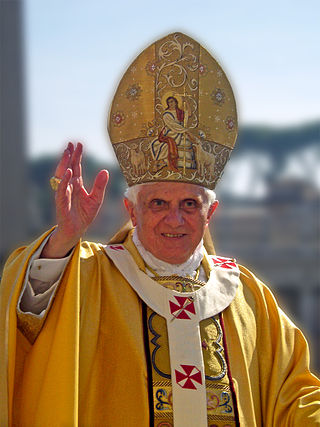
Dominus Iesus is a declaration by the Congregation for the Doctrine of the Faith, approved in a plenary meeting of the Congregation and signed by its then prefect, Joseph Cardinal Ratzinger, and its then-secretary, Archbishop Tarcisio Bertone. The declaration was approved by Pope John Paul II and was published on August 6, 2000.

The Lateran Treaty was one component of the Lateran Pacts of 1929, agreements between the Kingdom of Italy under King Victor Emmanuel III and the Holy See under Pope Pius XI to settle the long-standing Roman Question. The treaty and associated pacts were named after the Lateran Palace where they were signed on 11 February 1929, and the Italian parliament ratified them on 7 June 1929. The treaty recognised Vatican City as an independent state under the sovereignty of the Holy See. The Italian government also agreed to give the Roman Catholic Church financial compensation for the loss of the Papal States. In 1948, the Lateran Treaty was recognized in the Constitution of Italy as regulating the relations between the state and the Catholic Church. The treaty was significantly revised in 1984, ending the status of Catholicism as the sole state religion.

Pope Pius XI, born Ambrogio Damiano Achille Ratti, was the Bishop of Rome and supreme pontiff of the Catholic Church from 6 February 1922 to 10 February 1939. He also became the first sovereign of the Vatican City State upon its creation as an independent state on 11 February 1929. He remained head of the Catholic Church until his death in February 1939. His papal motto was "Pax Christi in Regno Christi", translated as "The Peace of Christ in the Reign of Christ".
The relations between the Catholic Church and the state have been constantly evolving with various forms of government, some of them controversial in retrospect. In its history, the Church has had to deal with various concepts and systems of governance, from the Roman Empire to the medieval divine right of kings, from nineteenth- and twentieth-century concepts of democracy and pluralism to the appearance of left- and right-wing dictatorial regimes. The Second Vatican Council's decree Dignitatis humanae stated that religious freedom is a civil right that should be recognized in constitutional law.

Mit brennender Sorge is an encyclical of Pope Pius XI, issued during the Nazi era on 10 March 1937. Written in German, not the usual Latin, it was smuggled into Germany for fear of censorship and was read from the pulpits of all German Catholic churches on one of the Church's busiest Sundays, Palm Sunday.
Statolatry is a term formed from the word "state" and a suffix derived from the Latin and Greek word latria, meaning "worship". It first appeared in Giovanni Gentile's Doctrine of Fascism, published in 1931 under Mussolini's name, and was also mentioned in Gramsci's Prison Notebooks (1971) sometime between 1931–1932, while he was imprisoned by Mussolini. The same year, the encyclical Non abbiamo bisogno by Pope Pius XI criticized Fascist Italy as developing "a pagan worship of the state" which it called "statolatry".
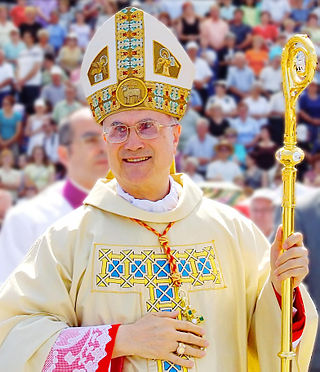
Tarcisio Pietro Evasio Bertone is an Italian prelate of the Catholic Church and a Vatican diplomat. A cardinal since 2003, he served as Archbishop of Vercelli from 1991 to 1995, as Secretary of the Congregation for the Doctrine of the Faith, Archbishop of Genoa from 2002 to 2006, and as Cardinal Secretary of State from 2006 to 2013. On 10 May 2008, he was named Cardinal-Bishop of Frascati.
Mystici Corporis Christi(The Mystical Body of Christ) is an encyclical issued by Pope Pius XII on 29 June 1943 during World War II. Its main topic is the Catholic Church as the Mystical Body of Christ.

Włodzimierz Halka Ledóchowski was a Polish Catholic priest who served as the 26th Superior-General of the Society of Jesus from 11 February 1915 until his death in 1942. Prior to taking holy orders, he was briefly a page in the Habsburg Court.
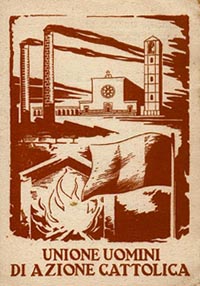
The Azione Cattolica Italiana, or Azione Cattolica for short, is a widespread Roman Catholic lay association in Italy.
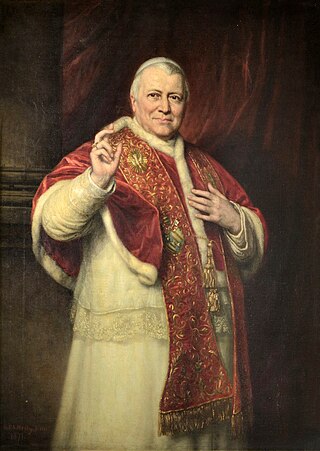
Papal infallibility is a dogma of the Catholic Church which states that, in virtue of the promise of Jesus to Peter, the Pope when he speaks ex cathedra is preserved from the possibility of error on doctrine "initially given to the apostolic Church and handed down in Scripture and tradition". It does not mean that the pope cannot sin or otherwise err in some capacity, though he is prevented by the assistance of the Holy Spirit from issuing heretical teaching even in his non-infallible Magisterium, as a corollary of indefectibility. This doctrine, defined dogmatically at the First Vatican Council of 1869–1870 in the document Pastor aeternus, is claimed to have existed in medieval theology and to have been the majority opinion at the time of the Counter-Reformation.

The relations between Pope Pius XI and Judaism during his reign from 1922 to 1939 are generally regarded as good. The pontiff was particularly opposed to antisemitism, an important issue at the time when Nazi Germany was rising. Certain favourable opinions of Pius XI were subsequently used to attack the perceived silence of Pope Pius XII.

The papacy of Pius XII began on 2 March 1939 and continued to 9 October 1958, covering the period of the Second World War and the Holocaust, during which millions of Jews were murdered by Adolf Hitler's Germany. Before becoming pope, Cardinal Pacelli served as a Vatican diplomat in Germany and as Vatican Secretary of State under Pius XI. His role during the Nazi period has been closely scrutinised and criticised. His supporters argue that Pius employed diplomacy to aid the victims of the Nazis during the war and, through directing his Church to provide discreet aid to Jews and others, saved hundreds of thousands of lives. Pius maintained links to the German Resistance, and shared intelligence with the Allies. His strongest public condemnation of genocide was, however, considered inadequate by the Allied Powers, while the Nazis viewed him as an Allied sympathizer who had dishonoured his policy of Vatican neutrality.
Pope Pius XII's 1942 Christmas address was a speech delivered by Pope Pius XII over Vatican Radio on Christmas 1942. It is notable for its denunciation of the extermination of people on the basis of race, and followed the commencement of the Nazi Final Solution program to exterminate the Jews of Europe. The significance of the denunciation is a matter of scholarly debate.

Vatican City pursued a policy of neutrality during World War II, under the leadership of Pope Pius XII. Although the city of Rome was occupied by Germany from September 1943 and the Allies from June 1944, Vatican City itself was not occupied. The Vatican organised extensive humanitarian aid throughout the duration of the conflict.
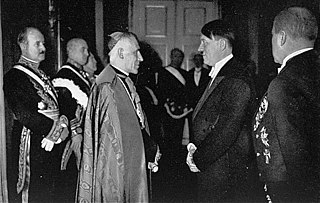
Popes Pius XI (1922–1939) and Pius XII (1939–1958) led the Catholic Church during the rise and fall of Nazi Germany. Around a third of Germans were Catholic in the 1930s, most of them lived in Southern Germany; Protestants dominated the north. The Catholic Church in Germany opposed the Nazi Party, and in the 1933 elections, the proportion of Catholics who voted for the Nazi Party was lower than the national average. Nevertheless, the Catholic-aligned Centre Party voted for the Enabling Act of 1933, which gave Adolf Hitler additional domestic powers to suppress political opponents as Chancellor of Germany. President Paul Von Hindenburg continued to serve as Commander and Chief and he also continued to be responsible for the negotiation of international treaties until his death on 2 August 1934.
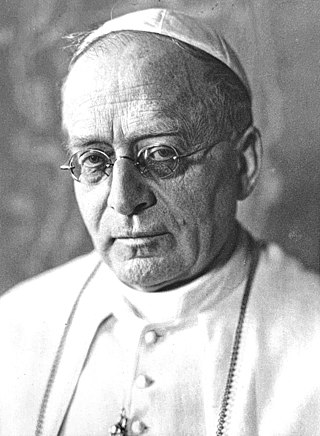
During the pontificate of Pope Pius XI (1922–1939), the Weimar Republic transitioned into Nazi Germany. In 1933, the ailing President von Hindenburg appointed Adolf Hitler as Chancellor of Germany in a Coalition Cabinet, and the Holy See concluded the Reich concordat treaty with the still nominally functioning Weimar state later that year. Hoping to secure the rights of the Church in Germany, the Church agreed to a requirement that clergy cease to participate in politics. The Hitler regime routinely violated the treaty, and launched a persecution of the Catholic Church in Germany.
The Roman Catholic Church in the 20th century responded to the challenge of increasing secularization of Western society and persecution resulting from great social unrest and revolutions in several countries. It instituted reforms, particularly in the 1970s after the Second Vatican Council, to modernize practices and positions. In this period, Catholic missionaries in the Far East worked to improve education and health care, while evangelizing peoples and attracting followers in China, Taiwan, Korea, and Japan.
Events in the year 1931 in Vatican City.














